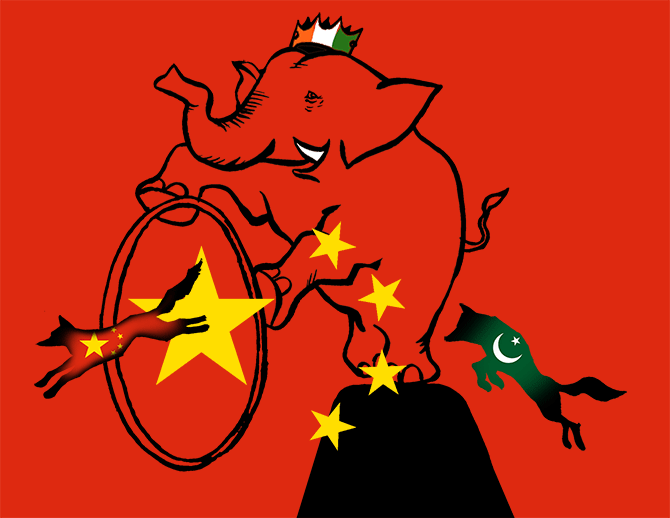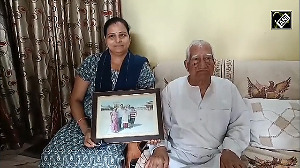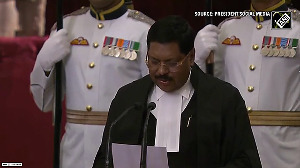'An elephant has to behave like an elephant and not shy away from confronting the jackals,' argues Colonel (Dr) Anil A Athale.
Illustration: Dominic Xavier/Rediff.com

Greetings to all fellow Indians on the occasion of the 68th Republic Day!
As we complete 67 years as a Republic and 70 years as an Independent nation this year, there is much that we can be proud of.
Food self-sufficiency, exploits in space like the Mangalyan, major reduction in poverty and elimination of hunger are indeed major achievements for any nation.
The greatest miracle is, of course, our survival as one nation!
India has more diversity than the continent of Europe, yet we have stayed united. The European Union, despite many unifying factors, has failed to even have quasi unity.
The only equally comparable feat is achieved by Indonesia besides the USA.
Having just pride in our achievements should not blind us to our failures.
Republic Day is an occasion to celebrate as well as introspect.
It is also a moment to look at challenges that the nation is likely to face in the future.
Compare India with where China is today. We roughly became independent at the same time, and in 1950 India was ahead of China in many fields.
Or compare India with where the USSR was in 1979 or Korea or Japan. This should lead to sober reflection on our lack of success.
General Krishnaswamy Sundarji, a cerebral military leader, once told me that the difference between India and China was on account of quality of leadership.
Without being labeled a Modi-bhakt, one can say with some degree of certainty that in him we have a leader who is dedicated to the progress of our nation.
Our leadership in the past has looked at the short term and forsaken long term development. We would rather give doles to farmers who commit suicide than solve the problems that underlie the sad state of agriculture in India.
We lack ambition for the nation. Every move towards some ambitious project is criticised and every effort is made to scuttle it.
We suffer from a 'teeming millions' syndrome. If a project does not have a 'direct' impact on poverty, it is dubbed anti-poor.
I recall this argument on every issue of defence-related spending with a very distinguished former diplomat with whom I dealt as a co-founder of a think-tank.
I clearly remember a former Indian Civil Services (the earlier avatar of the IAS) officer and a former defence secretary often repeating a mantra: 'In India you have to do good surreptitiously.'
I used to often argue with him, asking why if one wanted to do good, the need for secrecy?
Over time and as I matured in age, I realised the truth of his assertion.
We have a peculiar 'Indian crab' syndrome that takes greater pleasure in failure than in success.
In fact, we are positively embarrassed by success or victory. It is possibly a hangover of old attitudes bred by slavery.
Is it not time after 70 years as an independent nation that we outgrow this mentality?
The good news is that the younger generation seems free of this complex. P V Sindhu is an icon of this new India, defeating Chinese women at their sport, badminton, in China. As are our IT professionals and our soldiers.
One resolve all Indians must make today is to shun negativity and indulge in positive thinking and actions.
As our economy grows and we become the world's third largest economy, our challenges will grow manifold.
Our security policies have to graduate -- as they have somewhat haltingly done so -- from protecting territory to protecting our interests.
Here somewhere the domestic perversion of race for 'backward' status percolates in our approach to foreign relations.
As a nation we love to lament. Aye Mere Watan Ke Logon, a beautiful song that remembers a military disaster, has almost gained the status of a national song.
If we have to usher in progress and develop to our full potential, we have to give up celebrating victimhood.
It is time we stopped calling every victim of a terror attack a 'martyr.'
On the security front a major change has taken place after the 1990s.
During the Cold War era, we successfully steered clear of superpower rivalry. It is true that we were closer to the erstwhile Soviet Union, but we were not anti-American.
American military assistance to Pakistan did cause a military imbalance in the subcontinent, by puffing the Pakistani frog beyond its size.
But the aim of American military aid was not checking India; it was merely the price it paid to get Pakistani bases and its army on hire for use in the Middle East.
Until the Reagan era, when the Americans threw caution to the winds and created the monster of a nuclear Pakistan and a jihadi Frankenstein, the US was fairly mindful of Indian security.
The consequences of that disastrous blunder are likely to haunt us and the world for a long time to come.
Even more tellingly, after the demise of the Soviet Union, China has begun to emerge as a superpower to rival the US.
China has replaced the US as the patron of a revanchist Pakistan.
The major difference between American help to Pakistan and Chinese help to that rouge nation is that in the latter case, India is the direct target.
China is consciously using Pakistan as a proxy against India. In the 21st century we are confronted directly by a superpower.
This changed world balance of power leaves us no choice but to grow our economic and military muscle to match the Chinese at least in our zone of influence, the Indian subcontinent.
In an emerging multipolar world, India has to become one of the poles.
This is not due to some jingoistic notions, but is the result of our size.
An elephant has to behave like an elephant and not shy away from confronting the jackals.
Colonel (Dr) Anil A Athale is a military historian.






